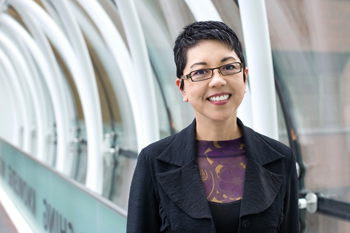Get to know Dr. Patricia O’Campo, new interim Executive Director of the Li Ka Shing Knowledge Institute

By Ana Gajic

Dr. Patricia O’Campo
As of April 1, 2018, Dr. Patricia O’Campo has taken on the role of interim Executive Director of the Li Ka Shing Knowledge Institute. Dr. O’Campo holds the Chair in Intersectoral Solutions to Urban Health Problems and is a researcher at the LKSKI. We sat down with Dr. O’Campo to learn more about her and her vision as the new interim Executive Director.
Q. Tell us about your research at LKSKI.
My research focuses on policies and health. We tend to think health policies and the health-care system are responsible for keeping people healthy. However, social and economic policies are larger determinants of health than the health-care system. My research focuses on how urban and social policies can ensure people are healthy.
One specific area of research I focus on is partner violence. Despite years of attention on this critical public health issue, one in four women will experience some type of partner violence in their lifetime. Children from families who experience violence also carry a high risk of being involved as a perpetrator or victim of violence when they become adults. There are currently too few effective prevention programs for partner violence. I work on the design and implementation of such programs.
Q. What are you most looking forward to as interim Executive Director of LKSKI?
I’ve been part of St. Michael’s Research Leadership Committee for almost three years now so I have a good knowledge of the opportunities and challenges that lie ahead. One new opportunity on the horizon looking at how to integrate the research from St. Joseph’s Health Centre and Providence Healthcare into the LKSKI to ensure that all scientists are well supported in their research. I’m looking forward to learning more about all the excellent research going on across the three sites, including getting closer to some of the emerging research initiatives designed to improve patient experiences.
Q. What are some of your goals for the LKSKI over the next six months?
Last year, St. Michael’s created ambitious policies around promoting gender equity in hiring and also in research leadership. Unequal hiring and treatment is often a product of the systems we create rather than just the attitudes of individuals in the workplace, and so policies are needed to remedy these types of situations. Continuing to support this focus and extending it to issues of equity in hiring other groups who might currently be underrepresented (such as racialized persons, individuals with Aboriginal identity, individuals with disabilities) will be important to our ongoing commitment to diversity and to ensure that our researchers and our leadership look like the city and the province in which we work.
Q. What has been your most rewarding moment in research at St. Michael’s Hospital?
For 11 years, starting when I first arrived in 2004, I directed the Centre for Urban Health Solutions (formerly called the Centre for Research on Inner City Health). The centre is dedicated to improving the health of those residing in cities, especially those experiencing marginalization. My most rewarding moments, which continue to this day, are working with a group of stellar scientists dedicated to generating evidence that inform solutions to improve the health of all populations.
Q. What’s one thing your colleagues might not know about you?
As much as I like research, I also really like teaching. Starting this week, as I’ve done for the past four years, I will be teaching a class to Regent Park residents. The students get a certificate from the University for attending this free course. It is by far my favorite class to teach.
About St. Michael’s Hospital
St. Michael’s Hospital provides compassionate care to all who enter its doors. The hospital also provides outstanding medical education to future health care professionals in more than 29 academic disciplines. Critical care and trauma, heart disease, neurosurgery, diabetes, cancer care, care of the homeless and global health are among the Hospital’s recognized areas of expertise. Through the Keenan Research Centre and the Li Ka Shing International Healthcare Education Centre, which make up the Li Ka Shing Knowledge Institute, research and education at St. Michael’s Hospital are recognized and make an impact around the world. Founded in 1892, the hospital is fully affiliated with the University of Toronto.
